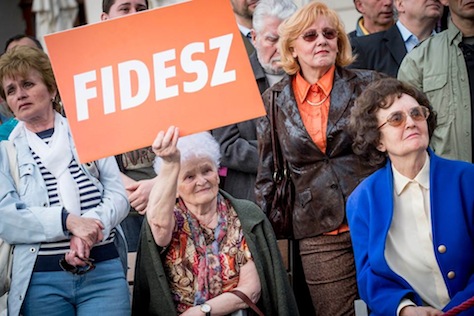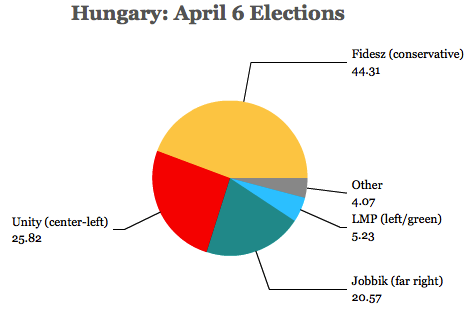With almost all ballots counted, Viktor Orbán has not only won reelection as Hungary’s prime minister, he will also command the same two-thirds supermajority as his party, Fidesz – Magyar Polgári Szövetség (Fidesz – Hungarian Civic Alliance), has held for the past four years. ![]()
But the other winner in Sunday’s election is the nationalist, far-right Jobbik Magyarországért Mozgalom (Jobbik), which improved on its 2010 performance to win nearly 21% of the vote.
* * * * *
RELATED: How Hungary’s Viktor Orbán got his groove back
* * * * *
With just over two-fifths of the vote, Fidesz will win over two-thirds of the seats in Hungary’s Országgyűlés (National Assembly), which Orbán reduced in number from 386 to 199 for this year’s election. That will continue its power to determine Hungarian policy, virtually without opposition — in the past four years, Orbán has used a similar supermajority to rewrite the Hungarian constitution, diminish the power of the constitutional court, and revise an election law that maximized his party’s gains in Sunday’s election.
Though Lehet Más a Politika (LMP, Politics Can Be Different), a liberal green/left party, seems likely to to make it into the National Assembly (just barely!), the election results leave Orbán with almost nearly the same supermajority that he had in 2010 and, in fact, Orbán is the first prime minister to win reelection in Hungary since 1990.
The center-left opposition, Osszefogas (‘Unity’), hardly won a quarter of the vote, and it barely overtook the surging, xenophobic, euroskeptic Jobbik. That’s despite a late-January attempt of the center-left and centrist opposition to unite behind Attila Mesterházy, the leader of the Magyar Szocialista Párt (MSzP, Hungarian Socialist Party).
It’s the worst of both worlds for European policymakers who hoped that the 2014 Hungarian elections might curb Orbán’s power — not only has Jobbik made real gains (thereby making itself almost as strong as the center-left opposition just two months before European parliamentary elections), but Orbán and Fidesz will hold an impregnable supermajority for the next four years to continue consolidating power, eliminating checks and balances and, potentially, reducing faith in the rule of law and Hungary’s democratic institutions.


